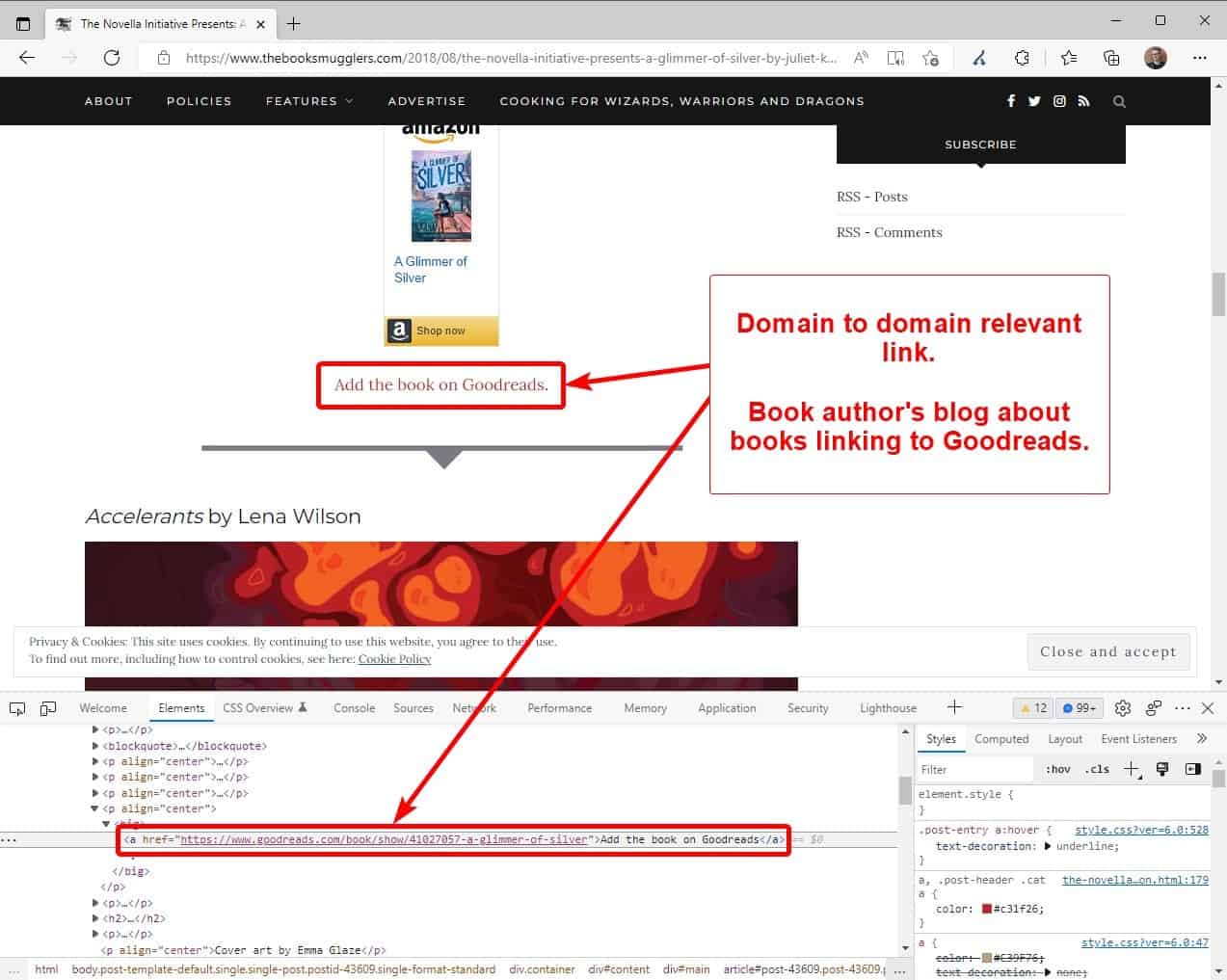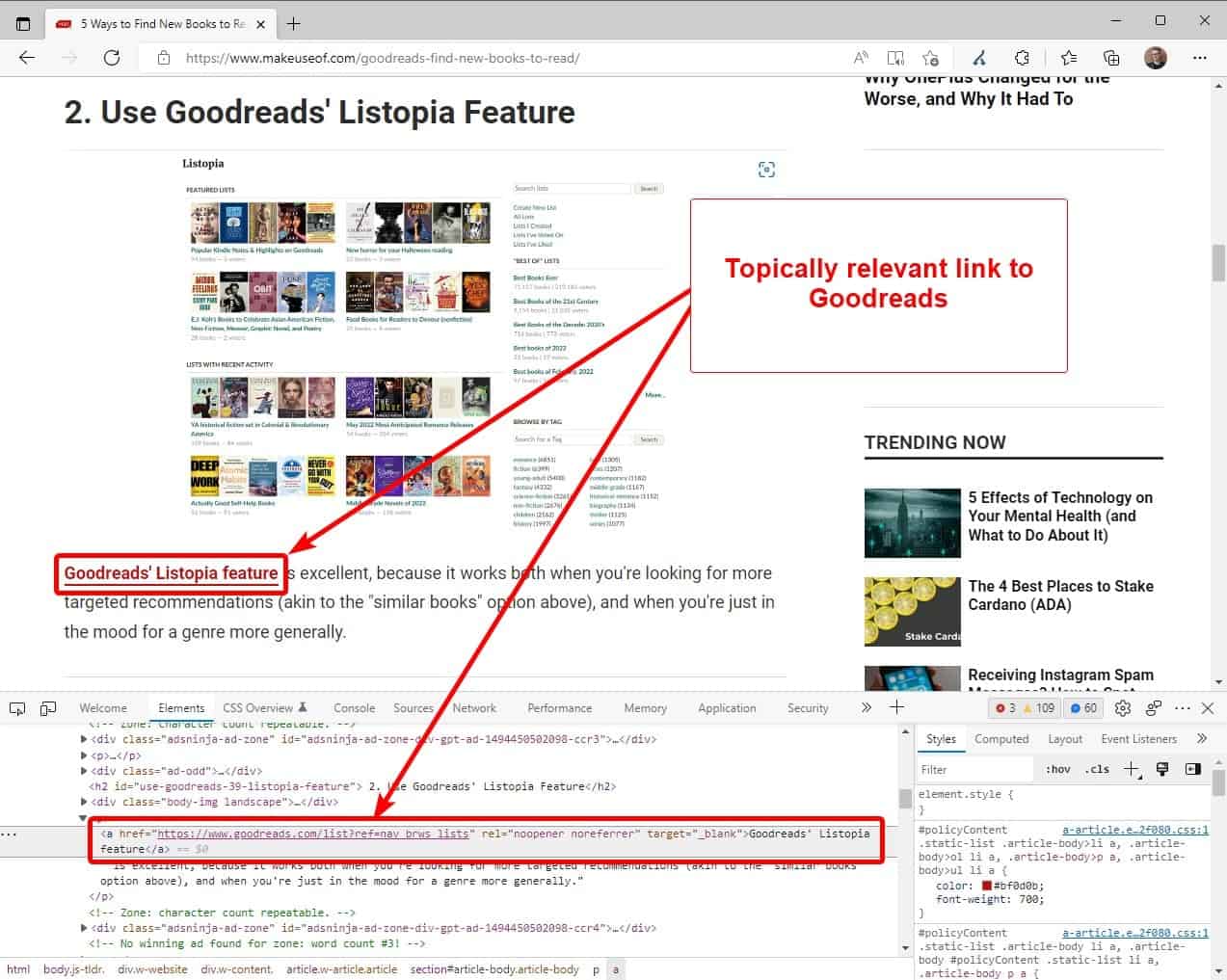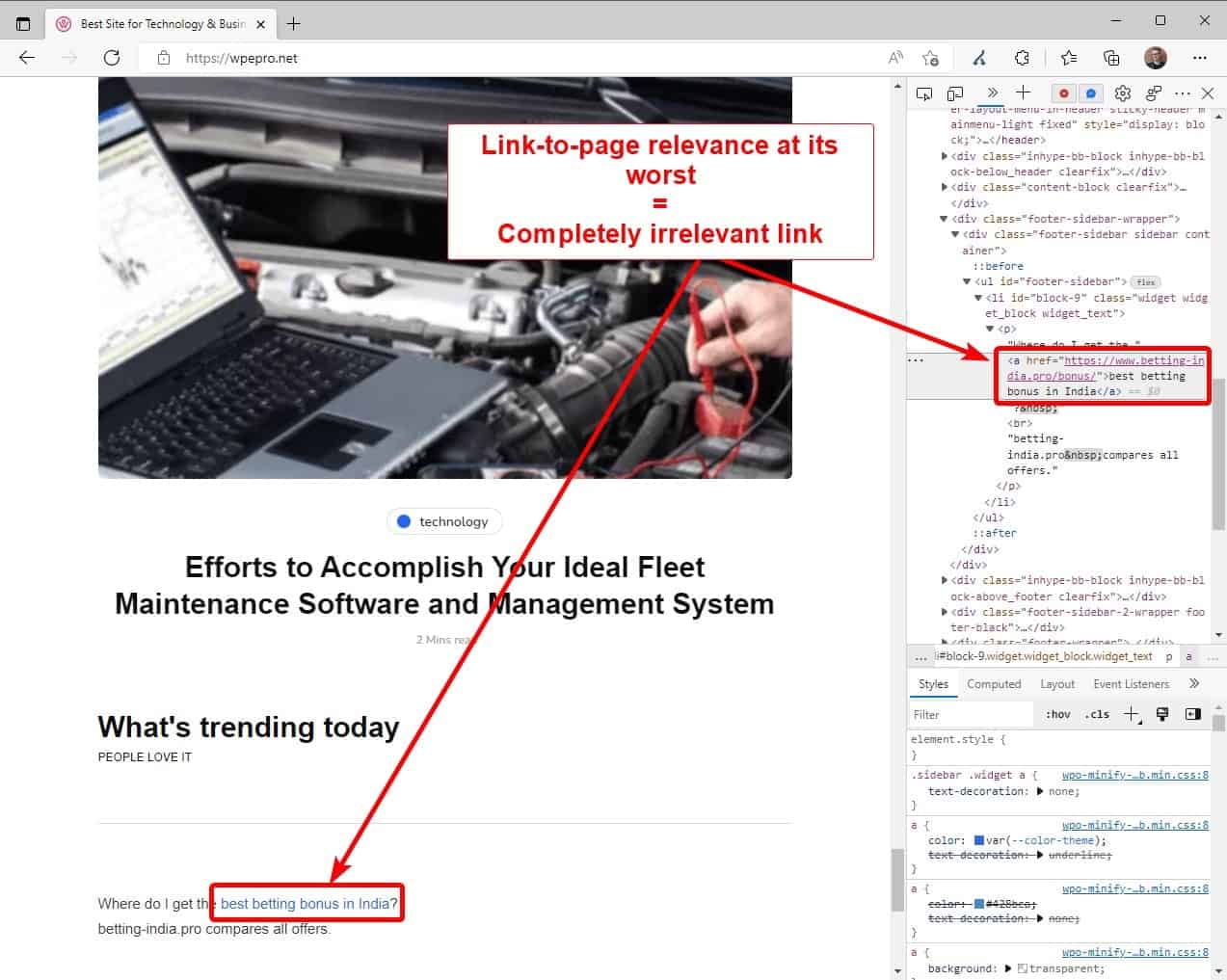
Link building is one of the cornerstones of search engine optimization.
How to acquire links, how to outreach, and what type of links to acquire - these are all essential questions you need to answer if you want your SEO efforts to be successful.
However, there’s one thing you should never forget when link building: not all links are created equal.
Search engines evaluate links along three criteria:
- the quality of the link,
- the authority of the linking page,
- the relevance of the link.
In this article, I’ll explore what link relevancy is, why it is important, how to check for relevancy, and how to get relevant links successfully.
Key Takeaways
- Link relevancy is important for SEO success.
- There are four types of link relevancy: domain-to-domain, page-to-domain, page-to-page, and link-to-page.
- You can check link relevancy by putting yourself in the shoes of a typical user.
- Relevancy is especially important for international SEO. If not, it utilizes the feedback it received to do better next time.
What is Relevance in Link Building?
In simple terms, in link building, relevance refers to the degree of topicality and commonality between the linking website and your website/brand.
As an example, if you have a landing page about car dealerships, how relevant is the content of the website linking to your landing page?
Does it contain keywords relevant to the industry?
Does the website have any authority on the subject?
These are all things search engines look out for when they decide the relevancy of a link.
Google has been created to connect people with the information they’re looking for, and an excellent way to do that is by checking how relevant a page’s backlinks are. If you understand the value of that information, you’ll understand why Google’s algorithms use relevance between entities to determine the quality of a page’s backlink portfolio.
Need Help With Link Building? Contact Us!
Why Should You Care About Link Relevancy
Danny Sullivan, a leading Google-webmaster contact person and an entrepreneur credited with popularizing the term “search engine marketing”, explained Google’s raison d’etre best:
When you come to Google Search, our goal is to connect you with useful information as quickly as possible.
Here, by useful, Sullivan means relevant.
Google primarily makes money through ads. This means their goal is to make sure users rely on the search engine for their needs and wants.
They naturally had to take steps to measure and understand the relevance of the search engine results pages they show their users and make sure they can connect them to the best possible results.
This is fairly straightforward, right?
We can even say that the relevance of the information being linked one to another is the backbone of Google altogether.
So, how can Google measure the relevance of a landing page to its users?
Well, that’s quite literally a multibillion-dollar question!
Google’s search engine’s success is entirely reliant on its algorithms being successful in displaying relevant results to their users.
How the algorithm does that is a very closely guarded secret, and even most engineers working on Google’s search engine aren’t privy to information about all the moving parts that power the search engine.
One thing is undeniable, however:
if you want to appear on top of search results, you need a good backlink portfolio with great relevance. Without it, your SEO strategy will be incomplete.
So, if you were wondering why you should care about link relevancy, this should answer your question: because you can’t afford not to care.
The 4 Types of Relevance in Link Building
Domain-2-Domain Relevance
Domain-to-domain relevancy, as the name suggests, is relevancy on the website level.
How relevant is the site linking to your website?
If your website mainly covers football and the website that links to one of your landing pages also mainly focuses on football, your domain-to-domain relevancy will be high.
Although this is the indicator people most often look at, it isn’t necessarily the most useful indicator to measure the relevance by.
Say, for example, your website is mainly about football, but one of your landing pages is about sports cars.
If a football website linked to that landing page from a page about football injuries and medical care, the domain-to-domain relevancy will still be high, BUT, Google will likely not consider the link itself very relevant.
This is critical to keep in mind.
Here’s an example of a link from a website about books linking to Goodreads:

Source: https://www.thebooksmugglers.com/2018/08/the-novella-initiative-presents-a-glimmer-of-silver-by-juliet-kemp-accelerants-by-lena-wilson.html
The above example is actually an ideal example where you can observe high Domain-2-Domain relevance as well as Page-2-Domain and Page-2-Page.
This is, without any exaggeration, the most ideal type of link you can get. But don’t get me wrong! As much as everyone would love to only ever get links like this, it is rare and, in some sense, not very practical.
Page-2-Domain Relevance
Arguably the most important kind of relevancy, page-to-domain measures how relevant is the linking page to the contents of your domain.
If your website is about used car sales, in the eyes of Google, the New York Times publishing a feature about your business and including a link to one of your landing pages will act as a hugely positive signal.
This is because the contents of the NYT story are directly relevant to the contents on your domain, and it acts as an important signal for Google and allows you to establish authority in your field.
Not only that - this is usually one of the easiest types of links you can acquire for your business/website.
It is extremely difficult to find domains that are exclusively about topics relevant to your website and get them to publish stories with links to your website.
It is relatively easier to find general news websites, blogs, etc., and have them run a story relevant to you and your business.
Here’s an example of a link from a page about reading books on a multi-topical website (Make Us Of) linking to Goodreads - world’s biggest database of books.

Source: https://www.makeuseof.com/tag/7-sites-decide-book-read/
Page-2-Page Relevance
Page-to-page relevance, as the name suggests, is the measure of the relevance between the two pages.
It is a moderately important signal Google uses to measure link quality: it is more important than domain-to-domain relevance, but it is less important than domain-to-page relevance.
If you’re wondering, why could the domain-to-domain relevance be less important than page-to-page, then the answer is simple. It is very difficult to get a highly relevant link from another domain in your niche.
In fact, many link builders get it totally wrong. They “are killing themselves” to get a link from your competitor. Which is both difficult and expensive. Instead, they should spend all this time, energy and money building a link from a site in a different niche, but with an article about your exact vertical.
Let me use another example to illustrate this best.
Say your website is about baby strollers. It would take extreme effort to get a link from a stroller producer’s, distributor’s or affiliate’s website.
You might be lucky and get in on an article that is about something random. Or, worse still, you get a link from their “Our friends” page. Both domain-to-domain relevant, but not great for SEO.
What I would prefer, and encourage you to do, is to get a link from a blog of a mum who talks about her experience with strollers.
This way you can get a high page-to-page relevance and, therefore, the link is probably going to be very powerful.
What you need to be specifically on the lookout for is the divergence between domain-to-page relevance and page-to-page relevance.
If the linking page is relevant to your domain, but it isn’t relevant to the specific page it has linked to, this acts as a red flag for SEOs.
One has to wonder: why specifically link to that page instead of a more appropriate one?
Something to note!
Page-to-page relevance is also particularly important for the landing pages selected while building second-tier links.
Another important thing to bear in mind…
Because websites generally tend to link to a website’s homepage, search engines don’t pay much attention to the page-to-page relevance of links pointing to home pages.
For product pages, offer pages, etc., however, page-to-page relevance becomes far more important.
Like Our Approach? Contact Us!
Link-2-Page Relevance
The last type of relevance pertains, exclusively, to the linking page: “How relevant is the link in the context of the page as a whole?” is the question link-to-page relevance tries to answer.
Imagine if the linking page’s content is about soft drinks, and in the middle of the article, they randomly mention car dealerships and drop a link to a car dealership website.
Here, the link to page relevance is really low.
Link-to-page relevance is important for search engines because they want to crack down on practices like link stuffing, which used to happen a lot in the past.
If your website actually gets too many of these links, Google might start getting suspicious, and you’ll have to use a tool to ‘disavow’ these links.
Basically, when dealing with link-to-page relevance only, Google views it as if you completely butchered an attempt to play with a shape sorter:
 Source: https://www.mccaffreyhealth.com/healthcare-system-like-shape-sorter-toy/
Source: https://www.mccaffreyhealth.com/healthcare-system-like-shape-sorter-toy/
Kinda like this guy:
We actually managed to find an example of a solely link-to-page relevant link.
Have a look at the below example of a PBN site (built on an expired domain) linking almost from its footer to a sports betting website using an exact-match anchor text:
We’ll just say this: it’s not how you build links done right!
How Do I Know My Links are Relevant?
Although there are some tools that allow you to check relevancy, they are rather imprecise: the best way to check relevancy now is to put yourself in a typical user’s shoes and check the link.
If you’re being sent to a page that expands and adds to the article, then this is a good link.
If not, then it is likely not a good link, and there might be something manipulative and fishy about it.
Frequently Asked Questions
Can I have multiple levels of relevance between my domains & links?
Yes, the types of relevance we outlined are not mutually exclusive, and you should aim to have all kinds of relevance when link building, but the most important are:
- Page-2-Page
- Link-2-Page
- Domain-2-Page - likely as high as a page to page, but it’s ok to have lower relevance here.
Ideal to have, but very very rare:
- Domain-2-Domain
What about adult/gambling websites? Do I need to seek relevance there as well?
Well, yes, as much as possible.
Non-relevant links can still add to the diversity of the profile, but won’t move the needle as much as the relevant ones.
In International SEO - does the relevancy matter as much as in English SERPS?
Due to a lower understanding of other languages by Google’s algorithms, we see that relevance is slightly less important for the link to bring value, but it does not mean you can go all crazy and link from whatever.
Since Google is playing with their ML algorithms, and recently thanks to its algorithm called MUM, they will be able to understand the context of non-English content and its surroundings a lot better.







